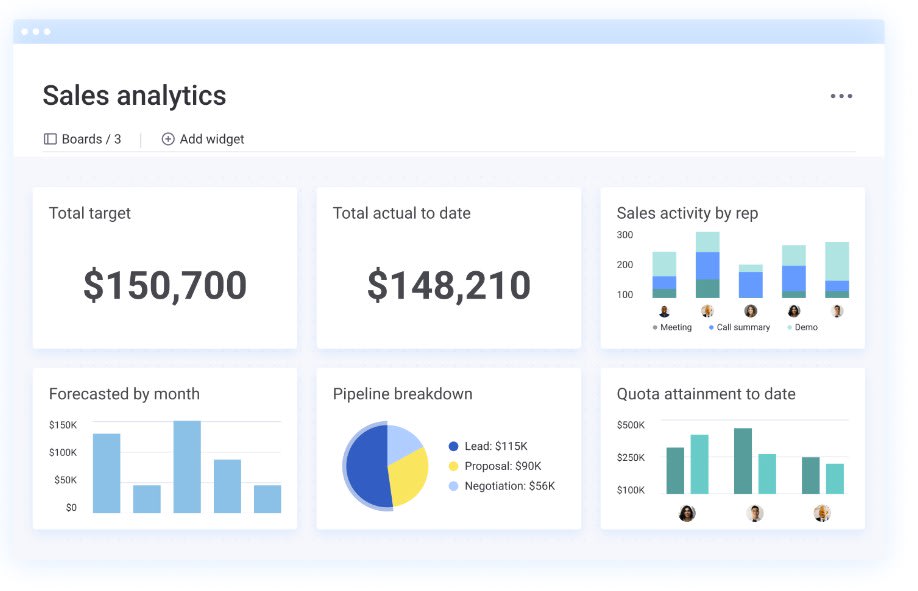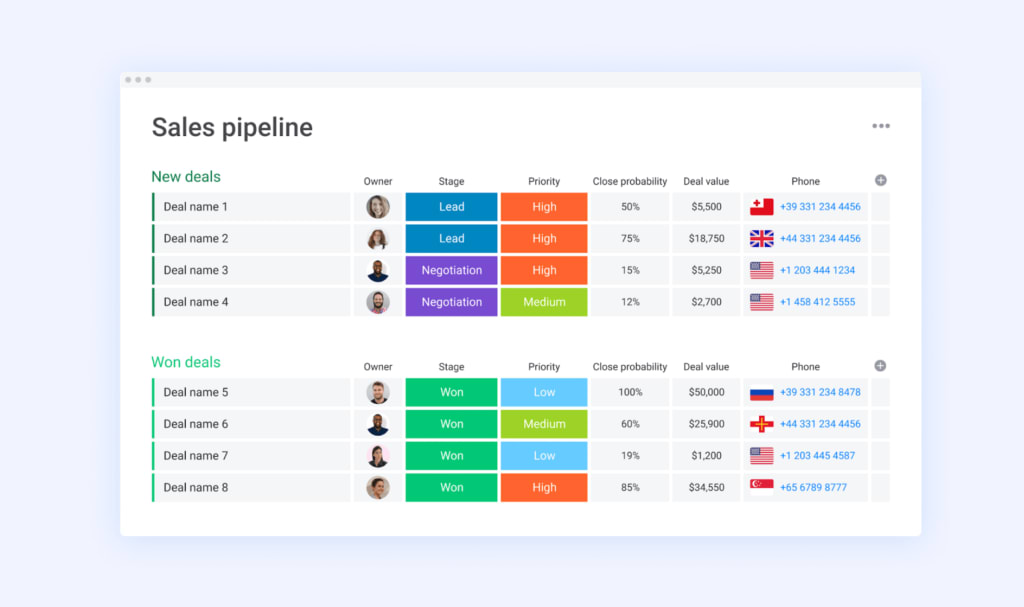Sales teams play a key role in delivering revenue and business growth. But for businesses to generate ROI, they must align their mission, approach, and targets.
This is where sales methodology comes in.
Essentially, your sales methodology is the roadmap that details how to attract and close new business opportunities. It provides a set of actionable steps for each stage of the buyer’s journey to nurture them towards a sale.
Let’s take a look at how a sales methodology can boost sales, key steps in the sales process, and the top sales methodology frameworks.
How the right sales methodology generates revenue
The objective of your sales methodology is to improve the efficiency and effectiveness of lead-to-opportunity conversion. And ultimately maximize sales revenue potential.
Here are just a few examples of how:
Improves training
For sales people to succeed, they need the right framework. They need to know which buyer they are targeting, what their pain points are, and how that directly relates to the business’s proposition.
Great sales forecasting is also helpful because it helps understand the assumptions and drivers of sales and then track and manage them.
These give new sales recruits the tools to generate revenue quickly.
Streamlines processes
Most sales teams end up spending a huge amount of time on admin. But a lot of this activity can be automated. From prospecting leads to sending cold emails and tracking email engagements.
With the right tools, businesses can also easily see the visibility of sales pipelines and daily activity — supporting more timely follow-up and preventing opportunities from leaking through the cracks.
Enables performance tracking
With a clear sales process, and all sales people following the same activities, it makes it easier to measure changes in deal flow, deals closed etc. Plus, it enables you to ensure they follow the right process – following SLAs set up with marketing on leads and passing over newly signed clients to accounts, and customer services for billing and management.
Collectively tracking an entire sales team’s performance can highlight best practice learnings to upskill the workforce or areas the business needs to improve to allow for shortened sales cycles and improved sales conversion. And crucially, it also helps run more accurate sales forecasting.
Sales methodology: Key steps in the sales process
There are several key steps in the sales process that become the foundation of a sales methodology.
- Map the entire sales process: Include the steps in the sales process between the customer, sales, and account management. Mapping this process visually with charts makes it simple to explain and follow.
- Understand buyer needs and create sales enablement: Build personas based on customer research, to articulate the biggest needs and pain points. Personas are key to sales conversations as it ensures the message resonates and prompts a reaction.
- Set clear goals and targets for each stage of the sales funnel: For instance, choose KPIs for outbound communications and set up sales meetings. You may also want to set SLAs for the length of time before the sales person needs to follow-up/action.
- Define an action for each stage of the sales funnel: To help sales reps achieve this, there are certain activities they can do at each stage. For example, to generate cold leads, sales reps can research and build a database, send emails, and track engagement.
- Track and measure results: Businesses can review sales performance monthly to assess training needs, changes to the market/buyer needs that require tweaks to the sales process, and tools they may need.
5 best practice sales methodology frameworks
To help you find the right framework for your needs, here is a breakdown the top sales methodologies:
Framework #1: SPIN Sales Methodology
After 35,000 sales calls, research found that successful salespeople focus on solving a prospect’s problem. To do this, they need to ask four types of questions that make up the acronym:
- Situation: To understand the prospect’s current situation. For example, what is your top priority for the year?
- Problem: To understand your prospect’s problems and their true motivations for solving them. For example, what is your biggest day-to-day challenge?
- Implication: To encourage the prospect to think about the consequences of not taking action to address those problems. For example, how much time does your current approach take?
- Need-payoff: To encourage the prospect to think about how solving the problem would change their situation for the better. For example, what would change if you did approach it differently?
There are several best practice tips to get this right. The biggest one is to make sure you ask open-ended questions. Yes and no answers just don’t give the level of detail a salesperson needs. That said, don’t cram too many of these questions into one call as it won’t feel like a natural conversation and can come across as dominating.
Framework #2: The CHALLENGER Sales Methodology
Other research found there are five different sales profiles:
- The Hard Worker – Highly self-motivated, these salespeople don’t give up easily and are keen on self-improvement.
- The Lone Wolf – These deliver results by sticking to their instincts rather than processes. So they can be difficult to manage.
- The Relationship Builder – Builds relationships through a consultative sales approach.
- The Problem Solver – Focuses on solving the problems both them and the client’s face.
- The Challenger – Develops a strong understanding of a business and uses its unique outlook to assist them in challenging prospects’ views.
40% of high-performing salespeople use The Challenger approach. And only 7% use a ‘relationship-driven’ sales methodology. Luckily, anyone can train to become a Challenger. This approach focuses on the principles:
- Teach – Educating the prospect and building trust. The Challenger digs into the prospect’s business and capabilities and suggests unique perspectives for the business or end customer.
- Tailor – Different stakeholders within the prospect’s business have different needs. The Challenger addresses these different needs in sales pitches by thoroughly understanding pain points.
- Take Control – The Challenger doesn’t let the prospect drive the sale process. They are assertive but not aggressive in challenging the prospect on ways of thinking. For example, encouraging them to consider the issue as a price.
Framework #3: MEDDIC Sales Methodology
This framework works along with other sales methodologies to better assess lead quality to save chasing bad leads. And ultimately to gain higher close rates and greater sales success.
It focuses on seven types of pre-qualifying questions that the sales teams can use. Some of these questions will be directed at the lead contact. Or, the salesperson will use them. These spell the acronym MEDDIC:
- Metrics: What is the economic impact of the solution? For example: What goals are you hoping to achieve?
- Economic buyer: Who has profit and loss responsibility for this? For example: Is anyone involved in the final decision?
- Decision criteria: What are their technical, vendor, and financial criteria? For example: How might you justify this purchase?
- Decision process: What happens? Define validation and approval? For example: What kind of paperwork needs to get pushed through?
- Identify pain: What are their primary business objectives? For example: How does [X problem] affect your bottom line?
Champion: Who will sell on your behalf? For example: Can they accurately explain the product’s benefits as they relate to the company?
Framework #4: Conceptual Sales Methodology
This methodology focuses on listening to the prospect, rather than focusing on the all-important pitch and how well it is received. The intention is to find out as much as possible about a prospect’s needs and to build a desired outcome. This helps to establish the reasons to buy. Essentially, how the product/service being offered solves the prospect’s challenges.
To gather this information, the salesperson needs to ask the right questions. These are split into five categories:
- Confirmation questions that reaffirm information.
- New information questions, for example, what the prospect wants to achieve.
- Attitude questions to understand a prospect’s connection to the problem.
- Commitment questions to gauge commitment to finding a solution.
- Basic issues questions that could cause potential problems and stop the sale.
Like with framework #3, these questions can help assess if a lead is worth qualifying.
Framework #5: SNAP Sales Methodology
Finally, this approach helps to get engagement with the prospects most difficult to sell to. It’s ideal for those that have little time to be taken through a long sales process – for example, C-suite executives:
- Simple: Make your proposal and process as simple as possible for customers
- INvaluable: Make sure that your customers rely on you
- Align: Always link back to your customers’ objectives, challenges, and needs
- Priorities: Ensure that they focus on what’s most important
In summary, the sales methodology you choose will depend on the products/service you sell and your target audience. For example, if you mainly deal with C-suite executives then framework #5 would be a good fit.
Final tip: Think about your needs and your prospect’s pain points. And then how your product/service meets that. This can help decide whether you need an approach that focuses on pain points earlier on in the sales process. Then, once you have decided on the best framework, you can start to think about how to introduce it to your team.
Implementing a new sales methodology with monday.com
With monday.com, you can say hello to time-saving automation, easy tracking, and a visual tool that everyone can access to monitor sales crm pipelines.
Here are just a few key features:
- Workflow management: Automated reminders via notifications
- Email marketing automation: With tailored emails triggered as the status of a lead changes
- Data-driven reporting: Our easy-to-use dashboard and charts make tracking and reporting on KPIs quick and digestible
You can tailor your strategy to work for you, without any development help. You can edit deal stages, add as many columns as you’d like, and more.
But at monday.com, we take sales efficiency even further with our monday sales CRM software. Build and set up your CRM in minutes and gain total transparency into your entire sales cycle. Get an overview of each deal in one click and make informed decisions based on real data.
No matter which methodology you choose, monday sales CRM can adapt to your needs and arm you with the information you need to close more deals.


Frequently Asked Questions
What is the sales methodology?
A sales methodology is the roadmap that details what sales need to do at each phase of the sales process.
How to choose the best sales methodology?
Choosing a sales methodology should be based on the key steps in your sales process. These are covered in the section above: Sales methodology: Key steps in the sale process.
What is the best sales methodology?
There are many sales methodologies you can choose from. Select one that feels like a natural fit with your proposition and customers. You can always test and revisit the sales methodology.
Start using the best sales methodology with monday sales CRM
With the right sales methodology and processes in place, you can easily set best practices for new recruits and improve existing sales teams.
What’s more, with the right sales CRM pipeline software, you can simplify tracking performance and see ways to improve efficiencies, reporting, and so much more to generate ROI for sales and drive revenue.

